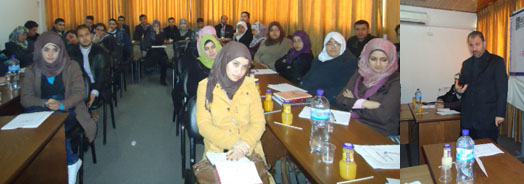The Legislative Process after the Split in Gaza
On 29 February 2012, the Institute of Law (IoL) at Birzeit University organised a legal encounter on the Legislative Process after the Split in Gaza. Delivered by Justice Dr. Abdul Qader Jaradah, the encounter brought together a large number of lawyers, law students, and representatives of interested bodies.
Having introduced the Birzeit Legal Encounters programme, Mrs. Lina Al -Tounisi, Coordinator of the IoL Gaza Office, welcomed the speaker and audience.
Having introduced the Birzeit Legal Encounters programme, Mrs. Lina Al -Tounisi, Coordinator of the IoL Gaza Office, welcomed the speaker and audience.
In his opening remarks, Justice Jaradah explained that regulations enacted before establishment of the Palestinian National Authority (PNA) is contradictory, unclear and inconsistent between the West Bank and Gaza Strip. This is due to successive, different political regimes that ruled over Palestine.
The first Palestinian Legislative Council (PLC) enacted a total of 127 regulations, which shaped the modern Palestinian legislative framework. Following the 2007 division between the Gaza Strip and West Bank, the Gaza-based PLC took over the responsibility for enacting legislation. In the West Bank, decree laws promulgated by the PNA President Mahmoud Abbas have been an essential legislative vehicle to manage affairs of the State.
A good regulation is marked by a reasonable length, enabling the layman can learn it without having to spend much time scrutinising and understanding it. Regulations should be consistent; a person who implements provisions of a certain law would not discover that they are contradicting another.
Justice Jaradah expressed his opinion about certain draft laws, which have been introduced in Palestine after the division. The Palestinian Draft Penal Law of 2010 proposed by the West Bank-based Ministry of Justice is both a new and an old regulation. It is new in terms of compilation and drafting, but old in terms of norms and provisions. Justice Jaradah wondered how a law as significant and serious as the Penal Law could be promulgated on grounds of a presidential decision, not through the legislature that represents the Palestinian society from across the spectrum. “How can this Law be enforced in part of the homeland, and not in the other?” Justice Jaradah inquired.
The Law of Penal Procedure amended in 2009 in Gaza vests judges with a broad power to establish proof. Justice Jaradah expounded that the amendment was designed to cover the failure of proof in the majority of court cases involving narcotic drugs. Most often, criminals go unpunished due to a reason of nullity or insufficient evidence. According to Justice Jaradah, the amendment to the Law of Penal Procedure is inconsistent because it provides unlimited powers to investigation officers, enabling them to take all evidentiary procedures to attain their desired goal of proving a crime.
In the West Bank, the Law of Illegal Gains of 2005 was amended in 2010 by a decree law issued by the PNA President. The Law’s title was changed into the Anti-corruption Law [Decree Law No. (7) of 2010 Amending the Law of Illegal Gains No. (1) of 2005]. As it roughly included all provisions of the old Law, this Decree Law effectively replaced, not amended, the said Law. Justice Jaradah also stressed that a Draft Law on Inheritance should be developed. The society is abounding in cases pertaining to hereditaments and a significant percentage of women do not obtain their hereditary entitlements. In case women seek redress through courts, disputes would last for extended years. These disputes are not limited to judicial litigations, but also involve innumerable conflicts and transgressions. At times, some heirs might be murdered.
The audience were interactive and interested in the subject. They made significant interventions and raised questions, including about “honour” murder. On behalf of the IoL, Mrs. Al- Tounisi thanked the audience for their active participation in the legal encounter.
The legal encounter was organised in partnership with the Konrad Adenauer Stiftung.










